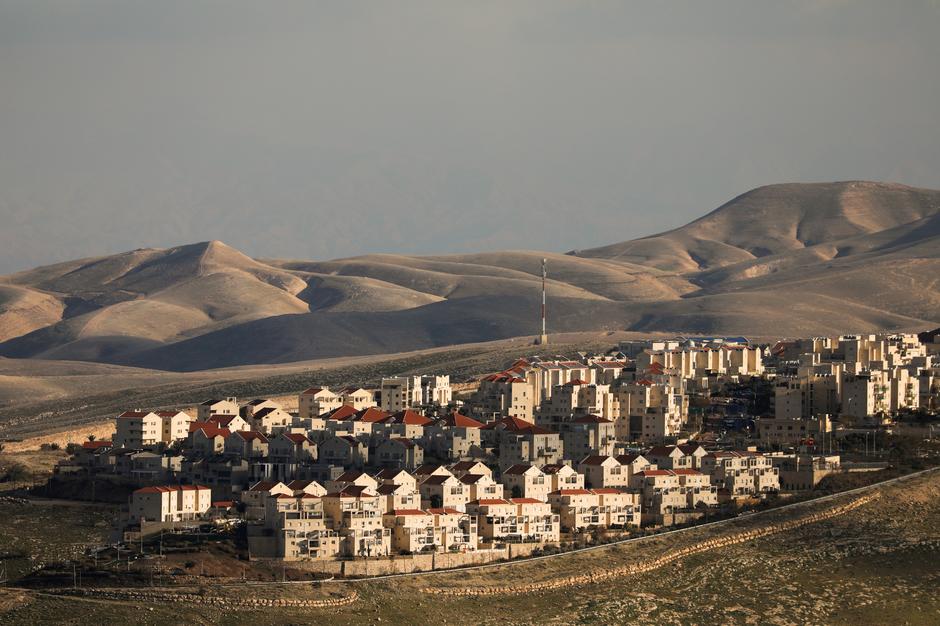EU’s mood changing as Israel threatens annexation
https://arab.news/zhqau

During the 53 years of Israel’s occupation, complete with systematic violations of international law and contempt for UN Security Council resolutions, at no point has the EU or any other major Western power seriously considered sanctions.
European politicians have baulked at the idea. It was an unthinkable option, not least owing to European guilt over the Holocaust and other past anti-Semitic atrocities. German leaders, in particular, backed off any such discussions for obvious reasons.
But is this wall beginning to crumble due to the threat of imminent Israeli annexation of parts of the West Bank? Are we starting to see the very first chinks in the resolute international refusal to hold Israel to account for its crimes? Remember the new Israeli coalition agreement permits Prime Minister Benjamin Netanyahu to bring annexation to a vote at Cabinet or in the Knesset from July 1.
When Netanyahu and his government first started to publicly push an agenda of annexation, the language from most European states was that such a move could not go “unchallenged.” No leader was prepared to spell out what this might mean, instead leaving it hanging out there as a vague threat.
Israeli annexationists count on European inaction and cowardice. They have much to back up this expectation. Israel demolishes EU-funded projects in the West Bank to the sound of press releases expressing concern or — drum roll — grave concern. Perhaps frustration might even be mentioned. The EU routinely declares settlements to be illegal and a threat to peace, but still allows settlement trade. Added to that is the belief of many on the Israeli right that the coronavirus crisis will distract European leaders from taking any meaningful action.
Yes, the EU is a dog that barks but does not bite. But perhaps some small teeth may be about to break through. Is this a watershed moment?
Eleven EU ambassadors, perhaps surprisingly led by the UK, made a formal protest to Israel last week. According to a leak to the Israeli press, the delegation made clear that “annexation of parts of the West Bank would destabilize the region and harm Israel’s standing in the international community.” The states involved alongside the UK were Belgium, France, Germany, Ireland, Italy, the Netherlands, Spain, Sweden, Finland and Denmark. Clearly, this represents the majority of Western Europe, hinting at the very different views among Eastern European states, most notably Hungary.
The inclusion of the UK, France and Germany should trouble Israel’s leaders. The mood in Brussels is changing. The precedent of allowing Israel to seize occupied territory by force is alarming to those who believe in the international rules-based order. The EU moved very swiftly to impose sanctions on Russia following its annexation of Crimea in 2014. It would be acutely vulnerable to the accusation of double standards if it just let Israel do the same. Why should Israel be let off when Russia was punished?
Such a telling point was made in a letter signed by more than 130 British politicians from all parties to Prime Minister Boris Johnson on Saturday. Never before have so many UK parliamentarians so willingly backed the option of sanctions on Israel in the event of annexation. It included former Cabinet ministers, the acting co-leader of the Liberal Democrats, and a former European Commissioner. It is no longer a fringe position. The organization of the letter in just a few days told of how willing politicians were to sign up with little to no persuasion.
Will Israel start getting worried about the EU? Probably not, given the continued US support. Netanyahu deliberately inserted annexation into the coalition agreement. In the past, he did not go down the annexation path, but his determination has been reinforced by the opportunity of Donald Trump’s presidency. Israel may never again have such a compliant White House. US Secretary of State Mike Pompeo was last month clear that annexation was ultimately Israel’s decision to make. The White House subsequently made it clear that this should happen in the context of a Palestinian state, as outlined in the Trump peace plan. This may delay the issue, but ultimately Netanyahu will not object too much, given he has accepted the plan and as long as the Palestinian state is as powerless and lacking in sovereignty as the Trump plan makes out. Israel would retain overall control of security and the borders.
Israeli annexationists count on European inaction and cowardice. They have much to back up this expectation.
Chris Doyle
The EU will probably not have the consensus necessary for sanctions, and neither will the UK. But, given the anger and the changing mood, a European response may be more than words for once. Options could include complete non-recognition of the annexation, including for the purposes of trade with the annexed areas. This is a minimum and will hardly put Israel off. The EU could ban all products and services from settlement areas with the option of toughening measures if Israel does not reverse its position. This should have happened decades ago and might create a few nervous twitches among Israeli officials.
A more effective measure would be to suspend the EU-Israel free trade agreement, ending all preferential access to the bloc for Israeli products. This would not be a sanction but would have an impact on trade. Some states may opt for the recognition of a Palestinian state. This would have symbolic value but should happen regardless of Israel’s illegal behavior. Netanyahu will not be put off by that.
The tools to pressure Israel short of full sanctions are there. It is, as ever, a question of political will. A failure to challenge Israel will not go unnoticed across the world, not least among those states with outstanding territorial ambitions.
- Chris Doyle is director of the London-based Council for Arab-British Understanding. Twitter: @Doylech







































